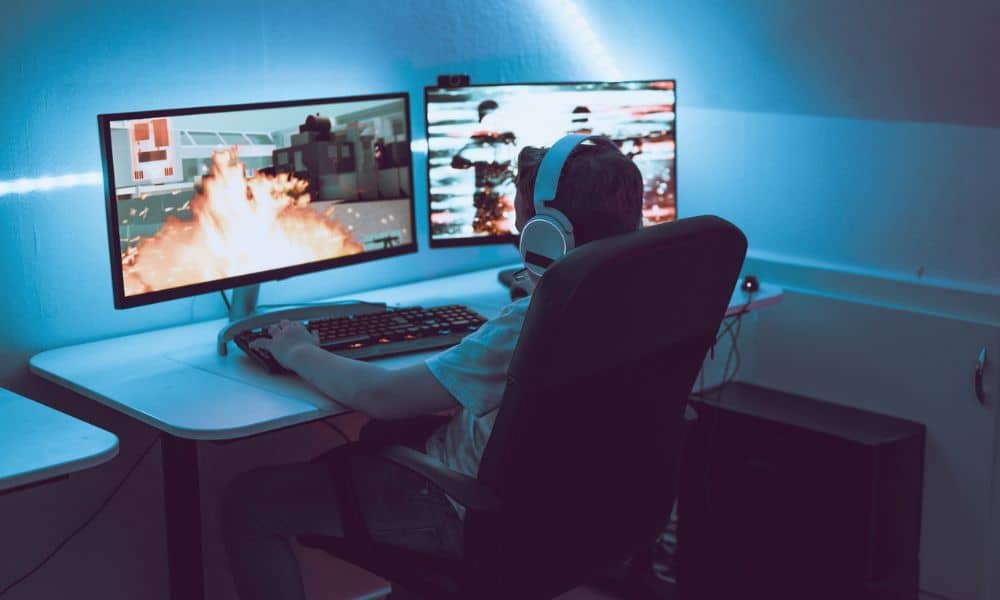Online gaming has transformed from hobby into regular, popularly accepted entertainment, with millions logging on every day to play for entertainment, competition, and social connections.
People jump into online games for a quick rank match in Call of Duty, to raid a boss encounter in World of Warcraft, or to play online chess. In dissimilarity to other forms of recreation, gaming today is ageless, borderless, and profession-free.
As the screens light up and excitement builds, an important question arises: is online gaming good for your energy level, or does it lead you to feel mentally exhausted and sluggish?
We will review the psychosocial, physical, and social factors of online gaming to determine if playing your video game of choice after work serves as a recharge—or if it serves as a drain.
Understanding Online Gaming: What Is It?
Online gaming covers video games being played over the internet, both alone and with players. These can be played on a wide range of platforms such as computers, consoles (example: PlayStation, Xbox), smartphones, and tablets. There are many genres of online games as well, from role play games to first-person shooters to strategy and simulation games.
Key Features of Online Gaming:
- Real-time multiplayer interaction
- Access to global communities
- Continuous content updates
- Competitive ranking systems
- Immersive graphics and sound effects
Digital spaces created by games like Fortnite, PUBG, League of Legends, and Minecraft provide a way for people to get significant engagement for hours.
With more screen time comes screen fatigue as well as intensification of the actual games affecting energy levels for gamers.
The Positive Side: How Online Gaming Can Boost Energy
1. Mental Stimulation
Games typically consist of problem-solving, multitasking, and decision-making under pressure; these activities engage brain regions related to:
- Cognition
- Focus and concentration
- Memory
As a result, this ‘mental workout’ can leave players with a sense of alertness and mental energy, especially if the game lasts a short duration.
2. Mood Enhancement
The activity of gaming also releases dopamine, which is the “feel good” chemical, and can aid in increasing your:
- Motivation
- Emotional resilience
- Stress relief
A good game can provide the same mental refreshing experience a fun workout provides or an entertaining movie.
3. Social Interaction
Many of the games available to play online are designed for teamwork and communication, be it voice or text. The practice of social bonding through cooperative missions games, role-playing and strategy in team-based games can help improve mood and stave off loneliness.
Outcome: The sense of positivity brought from engaging in social interaction generally spills over into a greater sense of well-being.
4. Escape and Relaxation
Gaming offers a break from real-life stressors, providing a virtual escape that can be emotionally refreshing. Especially after a tough day, diving into a virtual world can serve as a mental “reset.”
The Downside: How Gaming Might Drain Your Energy
1. Sleep Disruption
Playing games, and exposing yourself to blue light reading from screens in the evenings, may disrupt melatonin production in your body, resulting in poor sleep. Limited sleep leads to:
- Daytime tiredness
- Lower cognitive ability
- Mood disturbances
Gaming excessively late into night-time hours can have very adverse effects on your level of energy and health.
2. Eye Strain and Fatigue
Extended screen time leads to digital eye strain, characterized by:
- Blurred vision
- Dry eyes
- Headaches
This physical discomfort can contribute to overall tiredness and lack of motivation post-gaming.
3. Sedentary Lifestyle
The majority of online games are played sitting down. Long periods of inactivity from sedentary behavior is associated with:
- Decreased cardiovascular health
- Stiffness in muscle groups
- Decreased energy metabolism
Tip – Taking breaks and stretching or moving around will counteract some of this draining.
4. Mental Exhaustion
Games that are competitive or stressful (e.g., ranked matches or high-stakes scenarios) can lead to mental burnout. While excitement can be energizing, prolonged tension has the opposite effect.
How to Game Smart Without Draining Your Energy
Set Time Limits: Employ timers or gaming schedules to avoid over-indulgence.
Take Frequent Breaks: Practice the 20-20-20 rule: Every 20 minutes, look at something 20 feet away, for 20 seconds.
Stay Hydrated and Snack Wisely: Avoid junk food and caffeine energy drinks. Drink water, eat fruits and nuts to keep energy levels stable.
Utilize Blue Light Filters: Use screen filters or get gaming glasses that are intended to lower stress on your eyes, also help when playing at night.
Balance with Physical Activity: Take time to perform short ‘workouts’ or ‘walking’ breaks during gaming sessions to allow for blood circulation and avoid fatigue.
Conclusion: Balance is Key
Online gaming can either boost or rob you of energy, depending on how and how much you play. In moderation, gaming can be very stimulating mentally, relieve stress and allow social time with friends and family which can have a rejuvenating effect at the end of a gaming session.
On the other hand, overindulging or unregulated gaming (especially late into the night) can have many negative impacts on sleep, posture, and your overall wellness. Treat online gaming like any other lifestyle activity.
Enjoy it as a fun and engaging tool for mental relaxation—but don’t let it interfere with your sleep, health, or responsibilities. With mindful gaming habits, you can enjoy all the benefits without the burnout.
FAQs
Online gaming can improve my focus and cognitive function, right?
Yes, games that are strategic and fast-paced can improve your concentration, memory, and mental decision-making, as long as you play in moderation.
Why do I feel so tired after I play video games?
You could be feeling fatigued from hours of screen time, a lack of physical movement, eye strain, or the emotional effort in competitive games.
Is it bad for my energy if I play video games at night?
Yes, playing video games late in the evening could change your patterns of sleep, which leads to low energy during the day.
How many hours should a healthy gaming session be?
According to experts, continuous gaming time should be limited to 1 – 2 hours in a row with breaks in between so you stay concentrated and comfortable.
Can online gaming become addictive and affect my energy?
Yes, a gaming addiction can cause a person to neglect sleep, nutrition, and physical activity all of which can lead to chronic fatigue and low energy.



